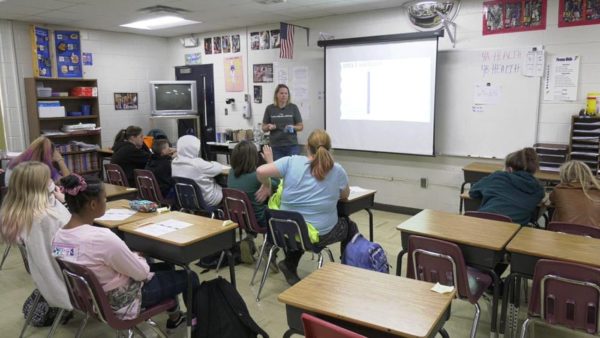
By Caroline Coleburn | December 26, 2019 at 8:49 AM EST – Updated December 26 at 8:49 AM
FLUVANNA COUNTY, VA. (WVIR) – We all know getting enough sleep each night is important, but are we doing enough to make sure children understand sleep is vital to their health and success?
Lack of sleep, especially in young people, can cause academic, social, and long-term health problems.
Experts at Sentara Martha Jefferson Sleep Medicine Center are taking their knowledge to middle school classrooms throughout central Virginia and the Shenandoah Valley to help students prioritize sleep.
“We’re not taught this, so we’re changing the conversation,” Sleep Center Team Lead Tabatha Greene said. “Too often kids aren’t getting enough sleep, which leads to adults not getting enough sleep, and we want to try to prevent that from happening.”
Kids need more sleep than adults – 8 to 10 hours of good sleep each night -but more children are not meeting that requirement.
“I feel, like, really grumpy in the morning, and I get mad easily,” Fluvanna Middle School student Arianna Tinsley said.
“These kids really struggle academically and socially, and they’re trying to fit sports in there, too. So if they’re not getting good-quality sleep, we’re just setting them up for failure,” Greene said.
As a result, many high schools across the country are back start times.
“Teenagers, they have a delayed phase, so their bodies are actually made to go to sleep later and wake up later,” Greene explained. “At one point, we were really fighting that rhythm, that sleep rhythm, with having earlier times.”
Children and teenagers can improve their academic performance by fixing sleep issues.
“My grades are starting to go up when I’m getting a lot of sleep, ” Fluvanna Middle School student Kayli Presnell said.
Experts also believe a lack of sleep across generations is contributing to higher levels of depression and anxiety. They say kids are diagnosed with attention disorders and put on medications before checking to see if they’re getting enough sleep.
“If we take a step back and look at our health habits; are we getting enough sleep? Is it good sleep? What can we do? Are they getting enough physical activity? And then, kind of start there before we start putting these diagnoses and medicines in kids,” Greene said.
Fifty-percent of children will experience a sleep problem, and parents should listen to kids and take their sleep patterns seriously.
“If they’re telling you they’re tired, there’s probably a reason for that, and it’s not just that they’ve been at school all day. They maybe need to change some habits, and looking into if they’re having good sleep habits,” Greene said.
The goal is to fix these sleep issues sooner.
“I think it’s a good thing to learn about this before it’s too late, and then you’re an adult,” Kayli said.
Copyright 2019 WVIR. All rights reserved.